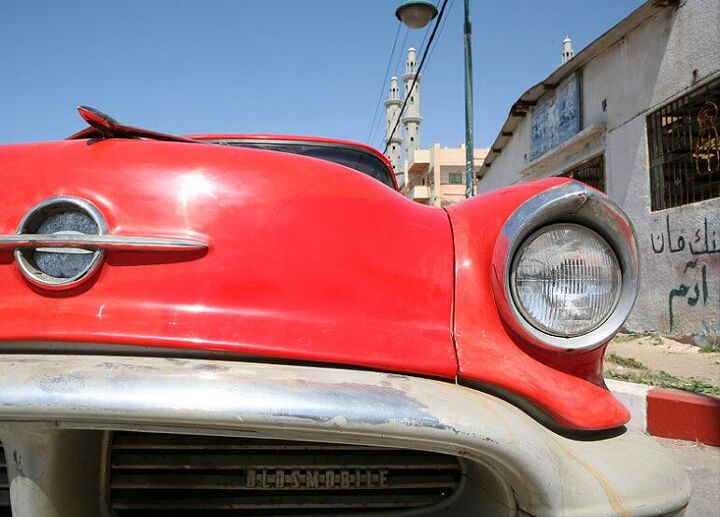The Curbside Classics Of The Gaza Strip
It’s a curious coincidence of history that the most anti-American parts of the globe are so dependent on old American cars. Havana is the classic example of this, and its still-rolling examples of classic American cars have become photographic icons, simultaneously representing both the failures of the communist government and the excesses of the preceding (but long-gone) American-backed regime. Another example of history written in the automotive landscape comes to us today from The BBC, which hosts a slideshow of cars from the Gaza Strip.
Mahfouz Caberetti is like any other classic car nut: he’s deeply proud of his still-running, classic Oldsmobile, and he gains intense satisfaction from wrestling with the wiring on his 1961 Mercedes. Unlike western car enthusiasts though, he must reckon with an Israeli blockade of Gaza, which prevents him from obtaining the spare parts he needs to keep his impressive collection of old iron running. And keeping these old cars running is more than just a hobby for Caberetti. Gazans young and old live under intense pressure and hopelessness, he says. Fixing old cars gives residents, especially teenagers, an escape from their 140 square-mile pressure cooker; it takes their minds off the constant stress of their situation. Though the travails of life in Gaza might be hard for American car nuts to fully understand, this escape into the simple pleasure of working on old machinery is a universal coping mechanism, crossing all lines of race, class and culture. And this rare point of common enthusiasm reveals our differences to be much smaller than we might otherwise imagine. In short, classic cars have succeeded in building cross-cultural bridges where 40 years of political negotiation have failed. That’s something every car nut should be extremely proud of. [Make sure to check out the slideshow, complete with commentary from Caberetti at The BBC’s website, Hat Tip: reader Ron Lason]
More by Edward Niedermeyer
Latest Car Reviews
Read moreLatest Product Reviews
Read moreRecent Comments
- Mebgardner I test drove a 2023 2.5 Rav4 last year. I passed on it because it was a very noisy interior, and handled poorly on uneven pavement (filled potholes), which Tucson has many. Very little acoustic padding mean you talk loudly above 55 mph. The forums were also talking about how the roof leaks from not properly sealed roof rack holes, and door windows leaking into the lower door interior. I did not stick around to find out if all that was true. No talk about engine troubles though, this is new info to me.
- Dave Holzman '08 Civic (stick) that I bought used 1/31/12 with 35k on the clock. Now at 159k.It runs as nicely as it did when I bought it. I love the feel of the car. The most expensive replacement was the AC compressor, I think, but something to do with the AC that went at 80k and cost $1300 to replace. It's had more stuff replaced than I expected, but not enough to make me want to ditch a car that I truly enjoy driving.
- ToolGuy Let's review: I am a poor unsuccessful loser. Any car company which introduced an EV which I could afford would earn my contempt. Of course I would buy it, but I wouldn't respect them. 😉
- ToolGuy Correct answer is the one that isn't a Honda.
- 1995 SC Man it isn't even the weekend yet






































Comments
Join the conversation
Ingvar +1
It looks like this topic is too heated for the conversation to stay car-centered. No real surprise there. In the interests of preventing a flame war, I'm going to close comments now. We have a good smattering of diverse viewpoints so far, and we've all learned the most important lesson of all: the bigger the problem, the less talking about it seems to help. Maybe we should just watch this and sing along instead.